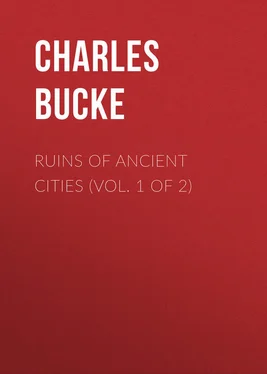Charles Bucke - Ruins of Ancient Cities (Vol. 1 of 2)
Здесь есть возможность читать онлайн «Charles Bucke - Ruins of Ancient Cities (Vol. 1 of 2)» — ознакомительный отрывок электронной книги совершенно бесплатно, а после прочтения отрывка купить полную версию. В некоторых случаях можно слушать аудио, скачать через торрент в формате fb2 и присутствует краткое содержание. Жанр: foreign_antique, foreign_prose, на английском языке. Описание произведения, (предисловие) а так же отзывы посетителей доступны на портале библиотеки ЛибКат.
- Название:Ruins of Ancient Cities (Vol. 1 of 2)
- Автор:
- Жанр:
- Год:неизвестен
- ISBN:нет данных
- Рейтинг книги:4 / 5. Голосов: 1
-
Избранное:Добавить в избранное
- Отзывы:
-
Ваша оценка:
- 80
- 1
- 2
- 3
- 4
- 5
Ruins of Ancient Cities (Vol. 1 of 2): краткое содержание, описание и аннотация
Предлагаем к чтению аннотацию, описание, краткое содержание или предисловие (зависит от того, что написал сам автор книги «Ruins of Ancient Cities (Vol. 1 of 2)»). Если вы не нашли необходимую информацию о книге — напишите в комментариях, мы постараемся отыскать её.
Ruins of Ancient Cities (Vol. 1 of 2) — читать онлайн ознакомительный отрывок
Ниже представлен текст книги, разбитый по страницам. Система сохранения места последней прочитанной страницы, позволяет с удобством читать онлайн бесплатно книгу «Ruins of Ancient Cities (Vol. 1 of 2)», без необходимости каждый раз заново искать на чём Вы остановились. Поставьте закладку, и сможете в любой момент перейти на страницу, на которой закончили чтение.
Интервал:
Закладка:
"Hippocrates had said in one of his letters, that he owed himself entirely to his country. And, indeed, the instant he was sent for to Athens, he went thither, and did not once stir out of the city till the plague had ceased. He devoted himself entirely to the service of the sick; and, to multiply himself, as it were, he sent several of his disciples into all parts of the country, after having instructed them in what manner to treat their patients. The Athenians were struck with the deepest sense of gratitude for this generous care. They therefore ordained, by a public decree, that Hippocrates should be initiated in the most exalted mysteries, in the same manner as Hercules the son of Jupiter; that a crown of gold should be presented him, of the value of a thousand staters 49 49 The Attic stater was a gold coin weighing two drachms.
, and that the decree by which it was granted him, should be read aloud by a herald in the public games, on the solemn festival of Panathenæa: that the freedom of the city should be given him, and himself be maintained at the public charge, in the Prytaneum all his lifetime, in case he thought proper: in fine, that the children of all the people of Cos, whose city had given birth to so great a man, might be maintained and brought up in Athens, in the same manner."
In the time of Agis and Pausanias, kings of Lacedemonia, Lysander was sent to besiege Athens. He arrived, therefore, at the Piræus, with a fleet of one hundred and fifty sail, and prevented all other ships from coming in or going out. The Athenians, besieged by land and sea, without provisions, ships, hope of relief, or any resources, sent deputies to Agis, to propose a treaty with Sparta, upon condition of abandoning all their possessions, the city and port only excepted. He referred the deputies to Lacedemon, as not being empowered to treat with them. When they arrived at Salasia, upon the frontier of Sparta, and had made known their commission to the Ephori, they were ordered to retire, and to come with other proposals, if they expected a peace. The Ephori had demanded, "that one thousand two hundred paces of the wall on each side of the Piræus should he demolished;" but an Athenian, for venturing to advise a compliance, was sent to prison, and prohibition made against proposing any thing of that kind for the future.
The Corinthians and several other allies, especially the Thebans, insisted that it was absolutely necessary to destroy the city without hearkening any further to a treaty. But the Lacedemonians, preferring the glory and safety of Greece to their own grandeur, made answer, that they would never be reproached with having destroyed a city that had rendered such great services to all Greece; the remembrance of which ought to have much greater weight with the allies than the remembrance of private injuries received from it. A peace was, therefore, concluded under these conditions: – "that the fortifications of the Piræus, with the long wall that joined that port to the city, should be demolished; that the Athenians should deliver up all their galleys, twelve only excepted; that they should abandon all the cities they had seized, and content themselves with their own lands and country." The deputies, on their return, were surrounded by an innumerable throng of people, who apprehended that nothing had been concluded; for they were not able to hold out any longer, such multitudes dying of famine. The next day they reported the success of their negociation; the treaty was ratified, and Lysander, followed by the exiles, entered the port. It was on the very day the Athenians had formerly gained the famous battle of Salamis. He caused the works to be demolished to the sound of flutes and trumpets, as if all Greece had that day regained its liberty. Thus ended the Peloponnesian war, after having continued during the space of twenty-seven years.
The walls, thus demolished, were rebuilt by Conon. He did more; he restored Athens to its former splendour, and rendered it more formidable to its enemies than it had ever been before.
Philip 50 50 Brewster.
having gained the battle of Cheronæa, Greece, and above all, Athens, received a blow from which she never recovered. It was generally expected, that Philip would avail himself of this opportunity of entirely crushing his inveterate enemy. That prudent prince, however, foresaw that powerful obstacles were yet to be encountered, and that there was still a spirit in the Athenian people which might render it difficult to hold them in subjection. It would appear, also, says an elegant writer, as if the genius and fame of Athens had, in the hour of her calamity, thrown a shield over her: for Philip is reported to have said, "Have I done so much for glory, and shall I destroy the theatre of that glory?" A treaty, in consequence, was entered into; and thus the Athenians, though reluctant to exist by Philip's clemency, were permitted to retain the whole Attic territory.
The number of men able to bear arms at Athens, in the reign of Cecrops, was computed at twenty thousand; and there appears to have been no considerable augmentation in the more civilised age of Pericles; but in the time of Demetrius Phalareus, there were found twenty-one thousand citizens, ten thousand foreigners, and forty thousand slaves.
Philip 51 51 Dodwell.
, son of Demetrius of Macedon, seems to have been one of the most inveterate enemies by whom Athens was ever ravaged. With unsparing cruelty he destroyed almost every thing which had either escaped the Persian invaders, or which had been erected after their final expulsion. Livy tells us, that, not content with burning and destroying the temples of the gods, he ordered that the very stones should be broken into small pieces, that they might no longer serve to repair the buildings; and Diodorus Siculus asserts, that even the inviolability of the sepulchres could not command his respect, or repress his violence.
Athens, however, still recovered some portion of its power; for when Sylla arrived before the Piræus, he found the walls to be sixty feet high, and entirely of hewn stone. The work was very strong, and had been raised by order of Pericles in the Peloponnesian war: when, the hopes of victory depending solely upon this port, he had fortified it to the utmost of his power.
The height of the walls did not deter Sylla. He employed all sorts of engines in battering them, and made continual assaults. He spared neither danger, attacks, nor expense, to hasten the conclusion of the war. Without enumerating the rest of the warlike stores and equipage, twenty thousand mules were perpetually employed in working the machines only. Wood happening to fall short, from the great consumption made of it in the machines, which were often either broken or spoiled by the vast weight they carried, or burned by the enemy, he did not spare the sacred groves. He cut down the trees in the walks of the Academy and Lycæum, which were the finest and best planted in the suburbs, and caused the high walls that joined the port to the city to be demolished, in order to make use of the ruins in erecting his works, and carrying on his operations.
Notwithstanding all disadvantages, the Athenians defended themselves like lions. They found means either to burn most of the machines erected against the walls, or by undermining them, to throw them down and break them to pieces. The Romans, on their side, behaved with no less vigour. Sylla, discouraged by so obstinate a defence, resolved to attack the Piræus no longer, and confined himself to reduce the place by famine. The city was now at the last extremity; a bushel of barley having been sold in it for a thousand drachms (about 25 l. sterling). In the midst of the public misery, the governor, who was a lieutenant of Mithridates, passed his days and nights in debauch. The senators and priests went to throw themselves at his feet, conjuring him to have pity on the city, and to obtain a capitulation from Sylla; he dispersed them with arrow-shot, and in that manner drove them from his presence.
Читать дальшеИнтервал:
Закладка:
Похожие книги на «Ruins of Ancient Cities (Vol. 1 of 2)»
Представляем Вашему вниманию похожие книги на «Ruins of Ancient Cities (Vol. 1 of 2)» списком для выбора. Мы отобрали схожую по названию и смыслу литературу в надежде предоставить читателям больше вариантов отыскать новые, интересные, ещё непрочитанные произведения.
Обсуждение, отзывы о книге «Ruins of Ancient Cities (Vol. 1 of 2)» и просто собственные мнения читателей. Оставьте ваши комментарии, напишите, что Вы думаете о произведении, его смысле или главных героях. Укажите что конкретно понравилось, а что нет, и почему Вы так считаете.












